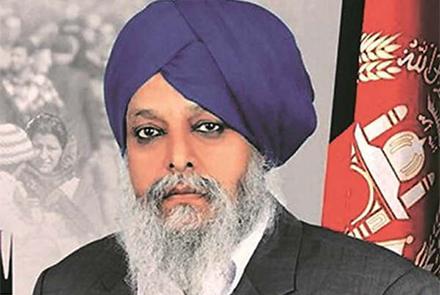Narinder Singh, the son of slain Afghan Sikh leader Avtar Singh Khalsa, said on Friday he wants to contest the October parliamentary elections in Afghanistan from the seat apportioned to minority community.
The Independent Election Commission (IEC) said this week the Hindu and Sikh community could nominate another candidate in the wake of Khalsa's death.
Khalsa, who was among those killed in last Sunday’s bombing in Jalalabad, had been the only Afghan Sikh member running for election.
The Indian Express reported that an official said there were a number of voices, including two MPs, calling for Narinder to participate in place of his late father.
“Everyone has been telling me to contest. (Sikh leader in India) Sukhbir Singh Badal and other leaders have expressed solidarity with us (Afghan Sikhs). I will run for the elections. My father attained martyrdom while fighting for the community. We will follow the footsteps of the Guru,” Narinder Singh told The Indian Express on Friday.
Asked about sections of Sikhs declaring that they would leave Afghanistan after the suicide attack, claimed by Daesh, Narinder Singh said, “Majority of those who are here will stay here only. Sikhs definitely want to move out, but no other country is giving them any concrete assurance about their rehabilitation if they move out.”
Last week Reuters reported that many among Afghanistan’s dwindling Sikh minority are considering leaving for neighboring India after the suicide bombing killed at least 14 members of their community.
At the funeral of one of the victims, one Sikh member Tejvir Singh said: “I am clear that we cannot live here anymore.”
“Our religious practices will not be tolerated by the Islamic terrorists. We are Afghans. The government recognizes us, but terrorists target us because we are not Muslims,” added Singh, the secretary of a national panel of Hindus and Sikhs.
The Sikh community now numbers fewer than 300 families in Afghanistan, which has only two gurdwaras, or places of worship, one each in Jalalabad and Kabul, the capital, Singh added.
Although almost entirely a Muslim country, Afghanistan was home to as many as 250,000 Sikhs and Hindus before a devastating civil war in the 1990s.
Even a decade ago, the US State Department said in a report, about 3,000 Sikhs and Hindus still lived in the country.
Despite official political representation and freedom of worship, many face prejudice and harassment as well as violence from militant Islamist groups, prompting thousands to move to India, their spiritual homeland.
Reuters also reported that following the Jalalabad attack, some Sikhs have sought shelter at the city’s Indian consulate.
“We are left with two choices: to leave for India or to convert to Islam,” said Baldev Singh, who owns a book- and textile shop in Jalalabad.
India has issued long-term visas to members of Afghanistan’s Sikh and Hindu communities.
“They can all live in India without any limitation,” said Vinay Kumar, India’s ambassador to Afghanistan. “The final call has to be taken by them. We are here to assist them.”

